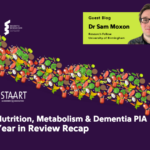
Dr Sam Moxon
Name:
Dr Sam Moxon
Job title:
Research Fellow
Place of work / study:
Area of Research:
Bioprinting of Blood Vasculature
How is your work funded?
Medical Research Council and the Doctor Donald Dean fund in dementia research.
Tell us about your career path to becoming an early career researcher.
Before I even considered science, I thought I wanted to study medicine and was accepted into Durham medical school. One week of work experience in a hospital was all it took to make me realise medicine was not for me. I knew I still had an interest in the medical field but realised I was more intrigued by the development of therapies for diseases rather than their actual diagnoses and treatments. On A level results day I scrambled for a last minute change of career and was accepted to study Medical Genetics at the University of Huddersfield. During a 4 year degree I gained a lot more insight into how the body works on a molecular and cellular level and spent a sandwich year working in vaccine development. After my degree I knew I wanted to pursue a research career and received PhD offers from the University of Liverpool and the University of Huddersfield; accepting the latter. During my PhD I worked on developing new platforms for creating better models of human tissues and diseases in vitro by focussing on combining cells with biomaterials and 3D bioprinting. At the end of my PhD it was time to move on to somewhere new and I accepted a post with Prof Nigel Hooper at the University of Manchester. I now apply the same principles developed in my PhD to the generation of 3D “mini brains” from human cells so we can try and pick apart the underlying mechanisms of dementia.
What does your research focus on?
My current work is centred around taking human neuronal cells derived from induced pluripotent stem cells and embedding them within 3D structures that resemble the extracellular matrix in the brain. By doing so we are giving the cells an environment that is more akin to the in vivo setting without having to take samples of human tissue. When cultured in such a setting, the cells often present behaviours that are characteristic of those seen in the brains of dementia patients. This allows us to try and pick apart those behaviours and analyse the molecular pathways that underlie them. The hope is that this will one day lead to methods by which dementia-causing diseases such as Alzheimer’s can be diagnosed and halted before any real damage is done to the brain.
Do you have any advice for someone looking to embark on a career in dementia research?
My main advice is to constantly speak to people across as many scientific disciplines as possible. Dementia is an extremely complex problem and it will take collaboration across many scientific, clinical and engineering disciplines to create real progress. If you want to succeed in dementia research, you cannot do it alone.
What are the best bits about being an ECR?
The ultimate upside to research is the fact you are working on something you are genuinely interested in. Normally, it is an issue that you care about and that gives the work genuine meaning. It is a very rewarding job despite of how challenging it can be.
What do you see as the main challenges?
The main challenge is a practical one. Dementia is not a simple problem and you are normally one of the first people to conduct your type of research. You often have to try and figure out stuff for yourself and that can take time but it is ultimately very satisfying when you find solutions.
What do you write about?
I enjoy writing about my research and the latest breakthroughs from other groups as well. I also like to write about the general “state of play” in the field, covering advice on finding that next position to how to deal with negative results.
Tell us a fun fact about yourself:
Over lockdown I have translated my passion for Italian food into becoming an accomplished pasta and pizza chef.
Why did you choose to work in dementia?
A lot of biomaterials research focusses on regenerating tissues like bone, cartilage or muscle. I believe this powerful tool is currently under-utilised in dementia research and it has the potential to make a huge difference in the fight against neurodegeneration.


